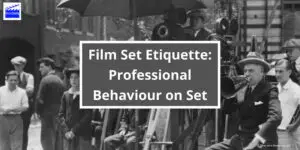How does an actor get a role? We take a look at this difficult career path.
Getting a role as an actor is a dream for many, but it is not always easy to achieve. It requires talent, dedication, and a great deal of hard work. There is no simple answer to the question of how an actor gets a role. However, there are certain steps that can be taken to increase the chances of success. This blog post will explore the various strategies actors can use to make themselves more attractive to casting directors and give themselves an edge over other hopefuls. It will also touch on the importance of networking, developing and honing your craft, and self-promotion in the entertainment industry. Finally, it will consider the impact of luck and timing in an actor’s career. With this information, readers will be better equipped to make informed choices about the paths they choose in their own pursuit of the dream of becoming an actor.
Casting Calls
Casting calls are an integral part of the entertainment industry. The Producer and Director work with the Casting Director to identify the roles and the types of character needing to be portrayed. The Casting Director uses this information to create a casting brief. Some casting briefs are submitted only to a limited number of acting agents for their prestigious clients, but the majority of casting briefs are uploaded to a casting call on a casting website.
Actors can see the casting calls on the websites for free, but pay a subscription to be able to apply. Many actors represented by an agent pay the subscription fees while their talent agent makes submissions on their behalf.
Each actor should upload their CV, headshot and showreel to the casting website before any submissions are made to the casting calls.
Agents and actors must also check that they are available for all the advertised casting and production dates. Acting roles fit in with the film and television production schedule, not the other way round, and stage actors have to be present for the rehearsal run and every performance. Casting directors work to tight timescales so can’t book alternative audition slots.
Casting Directors receive hundreds, if not thousands, of submissions. They need to see very quickly from the headshots and then showreels if an actor is right for the role. Perhaps five actors will be invited to audition for the role, at an event called a casting.
Invitations to audition, alongside the sides (pages of the script) to be learned by heart, are sent out at short notice. It often happens the day before, or even sometimes the same day.
Not surprisingly, they get very annoyed if an actor is invited in an then announces they are not able to work or audition on the advertised dates. The actor won’t be considered by the casting director for another role in the future, either.
That’s one of the many reasons actors are represented by a good agent if they have or are building a successful career. They help actors organise their complicated working life, and the relationships between agents and casting directors can be a great help to finding work in a very competitive field.
Attend auditions
When preparing to audition, it’s important for aspiring actors to understand the previous work of a director and think about the character within the current script, developing an understanding of the character and their situation and environment.
If you haven’t studied for a qualification at a performing arts educational institution, you’ll find acting classes and a masterclass or two in acting techniques and audition preparation will help you develop these preparation skills.
The purpose of a casting director’s job is ensuring that only the best talent is chosen to bring characters to life on stage or screen. For many years, the awards ceremonies and movie posters did not reflect the skill and importance of these industry professionals, but they really are responsible for launching and developing the acting career of every star of high-profile feature films and the west end, as well as providing the next job to working actors and looking out for talented newcomers to the acting profession.
Attending auditions is an important part of being an actor. It’s a chance to show casting directors your skills, personality and passion for the craft.
Being prepared and professional is key when you attend an audition, as it helps you look suitable and prepared for an acting career. Working actors have to have more than just good acting skills. They must be pleasant to work with, and flexibly adapt to the changes in script and director’s requirements even when working hours may be long and in difficult circumstances.
Before attending, it’s a good idea to warm up your body with stretches or breathing exercises. Turn up at the right place at the right time, wearing appropriate clothes. Make sure you look like your headshots – don’t change your hair colour, alter your hair cut, or get a visible tattoo when you know you could be called in for a casting.
Once at the audition, make sure to greet everyone in the room with a smile and introduce yourself confidently. Listen to instructions carefully, because after your first delivery of the lines you may be asked to take direction, trying something new suggested by the casting director.
Only one of the actors can be chosen for the role, so most actors will not succeed in most of their castings. That’s why a career in acting isn’t for everyone.
Stay prepared and practice
An actor must always keep training, learning and practicing.
As an actor, staying prepared and practicing is an essential part of success. It’s important to continually build and hone your craft. Acting involves the ability to take direction well, to be able to think on your feet and adjust quickly, as well as having great memorization skills.
Practicing scripts, learning lines and understanding characters’ motivations will help you succeed as an actor. Improving your physicality can also contribute positively; taking classes in dance, voice or movement can all help you become a more complete actor.
Additionally, when auditioning for roles it is important to be familiar with the character’s story and have a clear idea about how you would play them if cast, so acing classes in acting techniques and audition preparation can be very helpful.
If you can’t afford acting classes or formal training, search for a way to develop your skills in other ways. Get involved with community theater and amateur dramatics, read books about Stanislavski and other acting techniques, and apply for every casting website’s acting opportunties you can. Seek out opportunities to perform in front of a live audience, even if it’s singing and dancing in front of a community event, and say yes to unpaid opportunities as you build up acting experience (unless the production has funding, in which case they should pay their actors).
If you live too far from any large cities or towns to find acting opportunities and classes, you could travel to attend a masterclass every few months. But in these circumstances you would have to ask yourself how you will be regularly turning up at short notice for castings and work.
Make connections in the industry
Build relationships with casting directors in every casting you attend. Make yourself nice to know and good to work with. If a casting director sees you have acting skill and a professional attitude, they can keep asking you back in for role after role until they determine this is the part you were the best actor for.
Always be nice to your talent agent, and help them help you by keeping your calendar up to date, getting the supporting material they ask for, and turning up on time to every single casting and job. If you let them down, they’ll suffer reputational damage even though you’ll immediately lose your place on their roster.
On set, don’t bother the stars or production crew, especially for more lines or the next job. Be nice to everyone, and take an interest in everyone and everthing around you, while also remaining ready and prepared for your lines. During breaks and wrap parties, be interesting and positive.
If you do a good job engaging with all the industry professionals around you, and keep seeking new ways to work often, you’ll build a network of contacts. It’s not essential though, as the casting directors make the important suggestions, and this means an actor’s neurodiversity such as ASD isn’t a barrier to entry. Those who are difficult to work with, though, will quickly get a reputation. Word of mouth will keep them out of future castings and work.
TV & YouTube
TV programmes sometimes introduce new actors good at singing and dancing in front of a live audience, and then the audience at home votes for their favourite. This has been a successful route into the west end, films, television and radio for several actors who struggled to get into specialist drama schools to hone their craft over a three-year programme, and found it difficult to search for acting roles in musical theatre without this formal training.
YouTube: Top 10 Times Celebs Appeared on Reality Shows Before They Were Famous
On YouTube, actors can find comedy works well to build an audience. Depending on the scale of engagement, a successful YouTube or social media presence can raise your profile with the casting directors and help get your career moving.
Getting the Role
It’s possible to get into acting without drama school, and there are plenty of ways actors develop their skills. But whatever time, effort and money a newcomer may spend trying to get into the industry, they have to meet the right casting director at the right time for the right role to get paid work, and then repeat that lucky combination time and time again.
Even those who perform very well at castings have a slim chance of success landing the role. And when they do, it’s the stepping stone to the next job.






